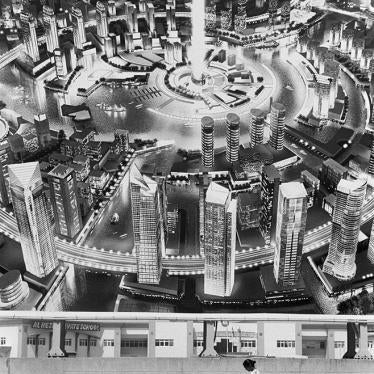(Beirut) – The UAE authorities in 2014 aggressively restricted the rights of freedom of expression, association, and assembly, cracking down on dissidents and anyone considered a threat to national security, Human Rights Watch said today in its World Report 2015. The authorities also failed to investigate credible allegations that security forces arbitrarily detained and tortured dissidents.
The UAE did not adequately protect the country’s migrant workers from serious abuses, including construction workers on one of its most high-profile projects. Migrant domestic workers in the country are employed in circumstances that sometimes amount to forced labor, slavery, or trafficking.
“The UAE proclaims itself a beacon of tolerance in the region but the facts reveal a much uglier truth that betrays a disdain for human rights principles and those who support them,” said Sarah Leah Whitson, Middle East and North Africa director at. “Governments and institutions seeking to develop closer ties with the UAE should take a close look at its recent record.”
In the 656-page world report, its 25th edition, Human Rights Watch reviews human rights practices in more than 90 countries. In his introductory essay, Executive Director Kenneth Roth urges governments to recognize that human rights offer an effective moral guide in turbulent times, and that violating rights can spark or aggravate serious security challenges. The short-term gains of undermining core values of freedom and non-discrimination are rarely worth the long-term price.
In August 2014, the UAE authorities issued an extremely broad counterterrorism law that will allow them to prosecute peaceful critics, political dissidents, and human rights activists as terrorists. The law classifies a wide range of peaceful and legitimate conduct as terrorism offenses and provides for the death penalty for, among other things, acts that the authorities deem to be “undermining” national unity.
In January, 20 Egyptians and 10 Emiratis were sentenced to five-year prison terms on charges that they set up a branch of the Muslim Brotherhood in the country. In August, the authorities detained 10 Libyan businessmen, at least two of whom they forcibly disappeared. At least three Emirati dissidents were sentenced to prison for criticizing the government on social media.
Migrant domestic workers, most of them women, are not covered by UAE labor law, and experienced a range of abuses. Some accused their employers of physical abuse, of confining the employees in the homes in which they worked, or of confiscating the workers’ passports, making it difficult for them to leave an abusive job situation. Many said their employers failed to pay the full wages due to them, forced them to work excessively-long hours without breaks or days off, or denied them adequate food, living conditions, or medical treatment.
Migrant workers continued to endure serious rights violations, including non-payment of wages and summary deportation at one of the country’s most high-profile projects, Saadiyat Island, which will host branches of the Louvre and Guggenheim museums and a campus of New York University.







